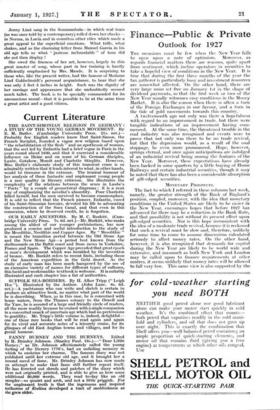Current Literature
THE SAINT-SIMONIAN RELIGION IN GERMANY : A STUDY OF THE YOUNG GERMAN MOVEMENT. By E. M. Butler. (Cambridge University Press. 21s. net.)— Probably few English readers know that Saint-Simon, the French Socialist, founded a vague new religion based upon " the rehabilitation of the flesh " and an apotheosis of woman, that the sect led by Enfantin had a brief vogue in Paris in the years round about 1830, and that it exercised a considerable influence on Heine and on some of his German disciples, Laube, Gutzkow, Mundt and Charlotte Stieglitz. However, Miss Butler's elaborate study of this transient craze is so admirably written that it lends interest to what, in other hands, would be tiresome in the extreme. The ironical humour of her analysis of these fantastic and unpleasant young people is a rare quality in literary criticism. She illustrates the complexity of the relations between the sexes in Laube's " Poets " by a couple of geometrical diagrams ; it is a neat way of emphasizing the novelist's absurdity. Poor Charlotte killed herself, but the men survived to become commonplace. It is odd to reflect that the French pioneer, Enfantin, cured of his Saint-Simonian heresies, devoted his life to advocating the construction of the Suez Canal, and that even in this connexion, where he deserved credit, he is forgotten.


































 Previous page
Previous page